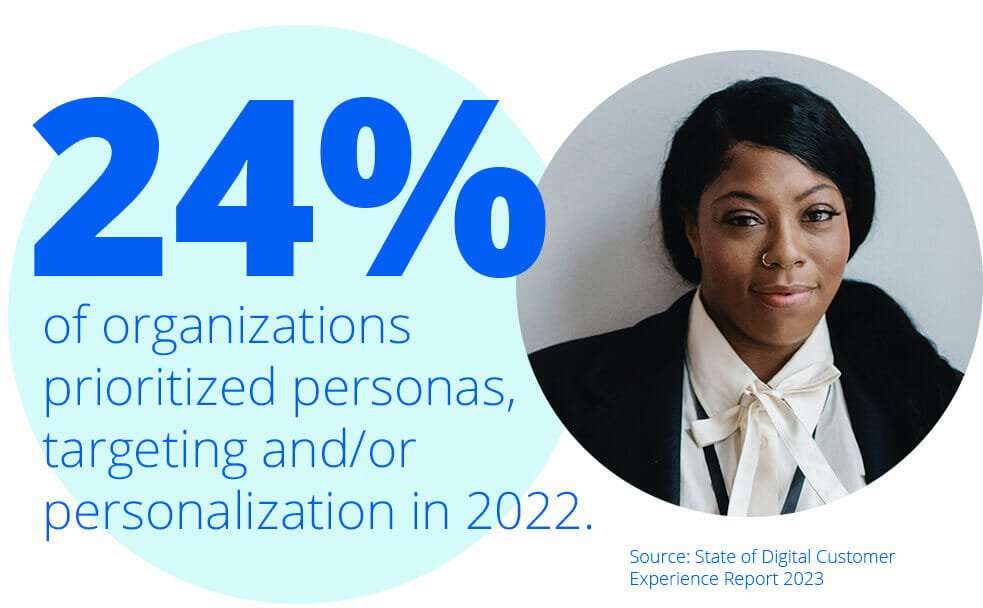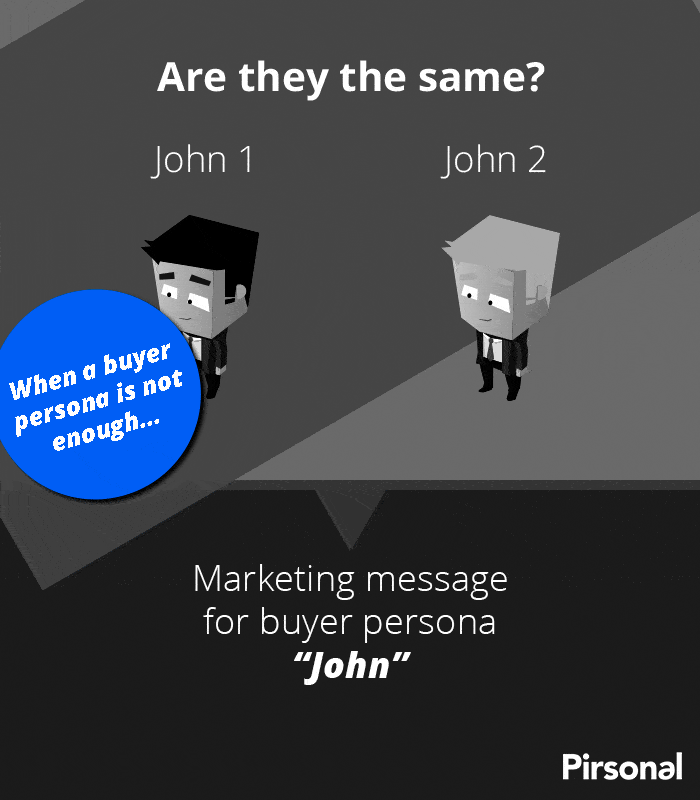Content marketing has been one of the key strategies B2B marketers have used to attract and educate customers over the last few years.
It has worked incredibly well for many.
At Pirsonal, for instance, it has been one of our key marketing strategies, even with our limited footprint when compared to some of our competitors.
Content marketing has helped us position Pirsonal as a top personalized video marketing software.
A key reason for this is that we’ve focused on providing content based on our experience in the video personalization niche by providing both flexible video personalization software and hands-on help.
But strategies change and questions arise.
The reality is that the vast majority of businesses with a digital footprint create content.
Also, with the ultra-accelerated democratization of AI for content creation, many marketing managers now can leverage technology to be more productive.
So, as a marketing leader, I wondered…
Is B2B content creation still valuable despite the saturation of competing content? After analyzing all the benefits and challenges, my conclusion remains the same.
Yes. Content creation is still a priority in the B2B space for marketing leaders.
Why? Content marketing builds trust, drives organic traffic, nurtures leads, showcases thought leadership, leverages social media, and fosters customer loyalty.
But there is a catch.
No matter the industry you are in, because of the increasing competition, when you target businesses, modern content creation requires a different approach.
In this article, you’ll learn seven compelling reasons why content marketing should be a top priority for B2B marketers in a competitive market and how to adapt to a competitive marketplace.
What Has Changed In B2B Content Marketing Strategies?
B2B marketers are changing how they make content due to changes in customer preferences, habits, and AI advancements.
One significant change is a shift towards creating more personalized and interactive content that resonates with their target audience across the customer journey.

This requires a deeper understanding of customer needs and preferences.
It also requires the ability to deliver valuable B2B content across multiple channels and formats.
Not that long ago, marketing managers could create and promote generic marketing content and get away with it.
Some would even wonder if it was useful at all to focus on customer personas and marketing segments.

But here is the deal…
B2B buyers are now more mature and there is strong competition in all channels and types of content.
Because of this, in my opinion, a content strategy should focus a lot more on quality rather than quantity.
The majority of organizations will focus on quantity. However, I believe that customers now realize the importance of accessing expert advice that a machine can not provide just yet.
Seven Reasons Why B2B Content Creation Is Still A Priority
Information is readily available at the click of a button. B2B buyers have become more discerning and self-educated.
For instance, not long ago, I needed to explain what a personalized video was and how to use it in marketing.
Now things have changed.
Potential customers know personalized videos are created automatically with customer data, but not all the details of this type of video marketing.
Then, content marketing plays a crucial role in capturing the attention of potential buyers, providing valuable insights, and establishing credibility in a competitive industry.
Let’s cover seven reasons why B2B marketing managers should prioritize content marketing in a competitive market.
Content Marketing Builds Trust and Credibility
Content marketing allows B2B companies to demonstrate their expertise and industry knowledge.
There are specifics of your industry that only your company can cover.
When you consistently create high-quality pieces of content that address the pain points and challenges of your target audience, your business builds trust.
Furthermore, you establish your brand and teams as thought leaders in your industry.
At Pirsonal, for instance, we can tell you how quickly personalized videos are produced since we have access to that information in our cloud software, UI, and API.
We can create all sorts of comparisons and analyses based on real-life information.
However, this can prove challenging for companies that don’t have a cloud, scalable solution or that rely on third-party vendors.
Trust and credibility are essential in the B2B buying process, and content marketing helps foster these relationships.
Content Marketing Drives Organic Traffic and SEO Benefits
An effective content marketing strategy creates value and relevant content for people with specific needs.
Search engines consider user needs, intent, and content value to determine how and when to display content to the audience.
This not only increases brand visibility in the B2B space but also generates leads from prospects actively searching for solutions in their industry.
For example, we made a mistake in our content marketing strategy by focusing too much on educating marketing leaders who were ready to buy personalized video solutions.
We missed the opportunity to educate those that weren’t even thinking about it but could become customers at some point.
You must identify the funnel or journey stage of the different personas your brand targets.
Your content marketing should meet people’s needs by providing content in formats that suit their preferred way of consuming information.
Content Marketing Nurtures Leads and Facilitates Sales
Content marketing goes beyond attracting new prospects; it also plays a vital role in nurturing leads and facilitating the sales process.
B2B marketers can create custom content for each stage of the buyer’s journey.
This helps to keep prospects interested and informed about their purchasing decisions through the content types that adapt to their needs.
I’ve found that one of the best ways to do this is to join forces with your sales teams.
They have direct interactions with potential customers that can help you find new content ideas from a realistic perspective based on buyer personas.
This leads to higher conversion rates and ultimately boosts sales.
An effective approach that requires a decent effort for many organizations is using personalization in your content marketing strategy.
You can do this through a personalized customer journey map.
In this video, I explain how to gather and use customer data to personalize your marketing.
Content Marketing Showcases Thought Leadership
Content marketing allows B2B companies to showcase their expertise and thought leadership in their industry.
By sharing insights, trends, and valuable information, businesses can position themselves as trusted advisors.
This not only attracts potential customers but also creates opportunities for partnerships, collaborations, and speaking engagements, further solidifying their reputation as industry leaders.
Through a targeted content strategy, businesses can increase market share.
This approach allows them to have more control over the price level when compared to their competitors.
Content Marketing Leverages Social Media and Influencer Marketing
Social media platforms have become powerful channels for B2B marketing.
Content marketing enables B2B companies to leverage social media to amplify their reach, engage with their target audience, and foster meaningful relationships.
Your organization can increase visibility and conversions by teaming up with industry influencers and thought leaders to expand their reach and tap into new networks.
Content Marketing Fosters Customer Loyalty and Advocacy
Content marketing is not just about acquiring new customers; it also plays a vital role in fostering customer loyalty and advocacy.
By consistently delivering valuable content, B2B companies can keep their existing customers engaged and satisfied.
This is the type of satisfaction that helps you increase customer lifetime value (CLTV).
Additionally, satisfied customers are more likely to become brand advocates, referring others to the business and helping drive organic growth.
How To Succeed In A B2B Content Marketing Strategy
To be effective and impactful, B2B content marketing strategies need to target specific customers with a personalized approach through the customer journey.
Otherwise, you risk your marketing from being like diluted decaf coffee.
And B2B buyers want fresh, pure, coffee that keeps them alert, informed, and in shape to achieve their next business goals.
This requires a deeper understanding of customer needs and preferences and the ability to deliver content across multiple channels and formats.
Balancing quantity and quality becomes a key challenge in this fast-paced content landscape.
With the abundance of content available, it becomes crucial to create content that stands out, offers unique insights, and delivers value to the business audience.
This requires marketers to continuously innovate and find creative ways to deliver their message effectively while maintaining content quality.
For example, the use of AI and personalization are more popular among content creators and strategists.
Conclusion
In a highly competitive market, content marketing remains a top priority for B2B marketing managers.
To succeed in B2B, focus on earning trust, attracting customers naturally, cultivating potential buyers, demonstrating expertise, using social media, and encouraging customer loyalty.
To do this effectively, leverage AI to better understand your customer base and their needs.
Use personalization to create content that resonates with their needs, concerns, goals, and current stage.
FAQs
Is content marketing suitable for all B2B industries?
Yes, content marketing can benefit B2B companies across various industries. The key is to create relevant, personalized, and valuable content that addresses the pain points and challenges of the target audience.
How long does it take to see results from content marketing?
Content marketing is a long-term strategy, and results may vary depending on various factors such as industry, competition, distribution channel, and the quality of content. It typically takes several months to start seeing significant results.
Should B2B companies focus solely on written content?
While written content is crucial, B2B companies should also diversify their content formats to cater to different preferences. This can include videos, infographics, podcasts, and webinars.
How can B2B companies measure the success of their content marketing efforts?
Businesses can measure and optimize the effectiveness of their content marketing using metrics like website traffic, engagement (time on page and bounce rate), lead generation, and conversion rates.
Can content marketing help in lead generation for B2B companies?
Absolutely. Content marketing plays a significant role in lead generation for B2B companies. By creating valuable content that addresses the pain points of their target audience, businesses can attract and nurture leads, ultimately driving conversions.

